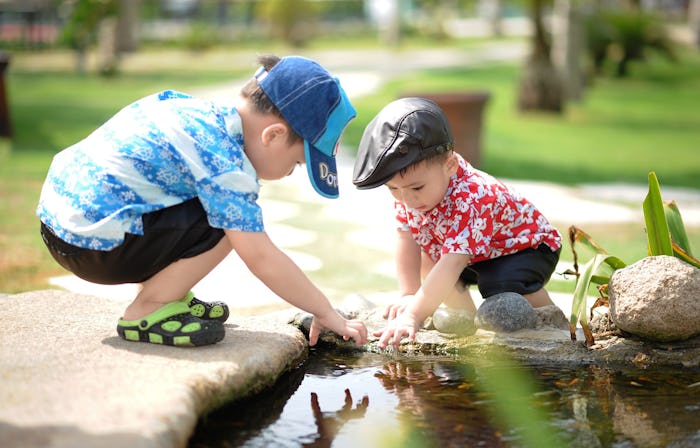Life

Babies In The US Are More Social, Study Finds
How interested we are in socializing depends on a lot of factors: personality, experience, and maybe even where we're born and raised. New research that looked at the temperaments of babies all over the world found that babies in the U.S. are more social than babies from other parts of the world. The question is, why?
Researchers from around the world came together to compare notes on the temperaments, personalities, and behaviors of babies and toddlers. Babies from Chile, Poland, and South Korea were compared to U.S. tots, and researchers found that there were a lot of interesting differences, which they believe are important clues about how culture impacts who we become. Where we are born and raised definitely has a big impact on what we're like: some of us have accents unique to our region, we might prefer certain types of food, and many of us are loyal to certain sports teams based on where we're from.
This particular study looked at was how social babies are at different points in their development throughout the first year of life. The study, which was published in the European Journal of Developmental Psychology, asked moms to fill out questionnaires about their babies' overall personality, temperament, and social behaviors.
The questionnaire asked moms about roughly 200 behaviors, putting them into various contexts that parents might commonly encounter in childrearing. The behaviors were then categorized into traits like "cuddliness." For the curious, the study found that South Korean babies were the most likely to enjoy cuddling.
U.S. babies were more likely than babies from other places in the world to be stimulated by social activities, and are easier to comfort when they become upset. Babies from Poland, on the other hand, were found to be harder to comfort. The babies from Chile, while perhaps not more social than those in the U.S., were found to be more active, and more likely to have difficulty concentrating for long periods of time. Babies from South Korea were the complete opposite: they were able to focus for longer, and were less likely to run around to burn off energy.
What researchers sensed about the outcome of this study was that social preferences and temperaments are established pretty early in life — and are heavily influenced by the cultural beliefs, practices, and behaviors of parents. For example, previous research found that the U.S. is a society with a lower tolerance for "negativity" than other places in the world; the result of which is that parents may discourage their children from displaying negative emotions.
The babies from Poland were found to display sadness more often than babies from the other countries, and researchers say this may not be an indication of unhappier babies: Polish culture is generally more open to discussing emotions, and infants therefore display their emotions more readily than, say, babies in the U.S. who may have been told not to cry.
Researchers weren't out to point fingers at parents or prove that some cultures are better at parenting than others; but they do think that we can learn a lot about parenting by looking at how its done in places outside our own culture.
“The vast majority of psychological literature is based in the West,” the study's author, Maria Gartstein, told TIME. “There is a question as to what extent [our findings] are universal.” By looking at what we have in common with other cultures, and noting the differences, researchers can better understand what types of behaviors are learned — and can therefore be changed.
The study has made such a splash that Gartstein and her team have been asked to write a book on the subject. With all the parenting guides out there, it will be interesting to see if such a cross-cultural book can change the discussion on parenting both in the U.S. and abroad.